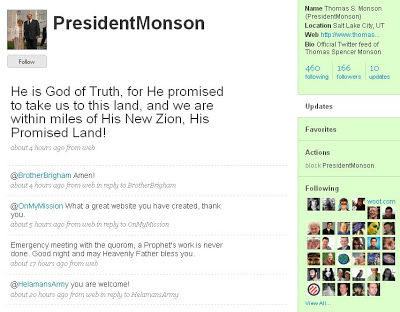As some of you may have noticed, we recently started using a Twitter account to let people know when we post new stuff or when new events come up. There is apparently a small but growing segment of LDS Twitter users, and we thought it might be useful to some people. There are a few Mormon-themed organizations that have Twitter accounts, one of which is the LDS news site Mormon Times.
This morning the Mormon Times Twitter account tweeted (what a stupid verb!) about a user who had set up an account purporting to be President Thomas S. Monson, current leader of the Church of Jesus Christ of Latter-day Saints. This account was set up yesterday, but it’s not a new idea: I checked around and found a couple different Monson impersonators on Twitter, though the others don’t seem to be taking the act as far. After only a day the new Monson impersonator has over 150 followers, but not everyone is fooled. One user even pointed out that the Faux Monson misspelled his wife’s name.

Like everything else online, use of Twitter is governed by the Terms of Service, which include and Impersonation Policy. Interestingly, the Impersonation Policy makes specific provision for parody Twitter accounts, apparently recognizing the limitations imposed by cases such as Campbell v. Acuff-Rose Music, the landmark copyright case against 2 Live Crew’s parody version of “Pretty Woman.” The Twitter Impersonation Policy pages states:
The standard for defining parody is, “would a reasonable person be aware that it’s a joke.” An account may be guilty of impersonation if it confuses or misleads others—accounts with the clear INTENT to confuse or mislead will be permanently suspended.
Under this standard, I think it’s pretty clear that Faux Monson is violating the Twitter Terms of service. The account currently has nothing ironic or joking about it — the user is acting as if he or she were Thomas Monson, claiming to be the official account. The page also carries a photograph of the real Thomas Monson and links to an LDS Church website about him.
The impersonation may also violate federal law under the Computer Fraud and Abuse Act (CFAA). Specifically, the impersonation may violate 18 U.S.C. § 1030(a)(2), which is an extremely broad provision that bars intentional unauthorized access or exceeding of access of any computer. Here, since the use violates the Twitter Terms of Service, it is potentially unauthorized (or exceeds authorization). This provision is has been held to apply to all computers connected to the Internet, including server-side systems. Even more dramatic, CFAA provides for significant damages or up to 10 years jail time, sometimes without even showing any evidence of harm caused by the violation.
Before you get all riled up, I don’t anticipate a lawsuit. That would be a waste of time and resources, and the LDS Church wouldn’t even bother. Some of the fake Monson Twitter accounts have been around for nearly a year, and I’m sure other social networking sites have similar impersonators. However, there is some danger of misunderstanding or miscommunication. The Office of the First Presidency could always keep tabs on the impostors, and request that they be terminated by the service provider if things get out of hand. Or better yet, perhaps people should not be quite so gullible and link up with false accounts.
Earlier this month Sander wrote about the LDS Church’s increased online presence, and how positive it can be. But the Faux Monson is an example of the potential down-sides of Internet involvement. A false Twitter account is relatively inconsequential, but I can imagine more serious scenarios. I think the benefits outweigh the occasional annoyances, but Church representatives will have to be aware that more issues like this will appear in the future.